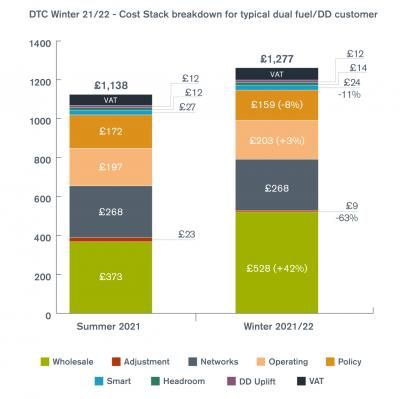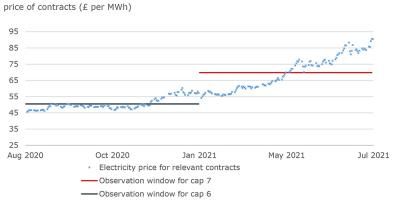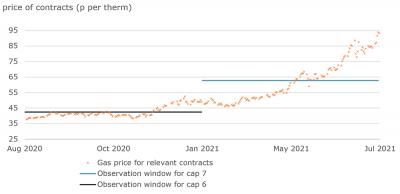Record gas prices drive up price cap by £139 – customers encouraged to contact supplier for support and switch to better deal if possible
- Support available for customers struggling to pay bills or in vulnerable circumstances with additional help for those on prepayment meters
- Energy suppliers sign up to industry commitment to reach out to those who most need help this winter
- Customers can avoid the increase by shopping around or asking their supplier to put them on a better deal
The energy price cap will increase from 1 October for the 15 million customers it protects. Those on default tariffs paying by direct debit will see an increase of £139 from £1,138 to £1277. Prepayment customers will see an increase of £153 from £1,156 to £1309.
This increase is driven by a rise of over 50% in energy costs over the last six months with gas prices hitting a record high as the world emerges from lockdown.
Surging global fossil fuel prices are already driving up inflation for consumers, making fixed rate energy tariffs not covered by the price cap, as well as petrol and diesel more expensive.
The price cap offers a safety net for customers who haven’t switched by making sure that suppliers only pass on legitimate costs.
Those on default tariffs are saving an estimated £75-£100 or £1 billion every year as a result.
Any customer in vulnerable circumstances or worried about paying their energy bill should contact their supplier to access the support available.
Customers may be eligible for extra help such as affordable debt repayment plans or payment breaks, emergency credit for prepayment meters and a £140 bill rebate under the Warm Home Discount.
Last week suppliers also signed up to an industry commitment to reach out to those who most need help this winter.
Customers can also shop around to save money before the increase takes effect on 1 October.
Those who don’t want to switch supplier or are unable to can ask their supplier to put them on a better deal.
Jonathan Brearley, chief executive of Ofgem, said:
“Higher energy bills are never welcome and the timing and size of this increase will be particularly difficult for many families still struggling with the impact of the pandemic.
“The price cap means suppliers only pass on legitimate costs of supplying energy and cannot charge more than the level of the price cap, although they can charge less.
“If you’re struggling to pay your bill you can get in touch with your supplier to access the help that’s available and if possible, shop around for a better deal.
“We have put tough rules in place to ensure suppliers treat customers who are struggling with bills fairly, and welcome their commitment to reach out to those who most need help this winter. Where help is not forthcoming, we will not hesitate to act.
“I appreciate this is extremely difficult news for many people, my commitment to customers is that Ofgem will continue to do everything we can to ensure they are protected this winter, especially those in vulnerable circumstances.”
Ofgem adjusts the price cap twice a year based on the latest estimated costs of supplying energy.
The biggest and most unpredictable factor is the wholesale cost of electricity and gas paid by suppliers and influenced by global markets. This accounts for roughly 40% of the overall price cap level.
Gas prices have risen to a record high in Europe due to a recovery in global demand and tighter supplies. This is increasing the cost of heating homes and pushing up electricity prices.
Last winter, the level of the cap fell by £84 after passing onto customers the savings from lower wholesale energy costs as countries went into lockdown and demand fell.
Notes to editors
- Help available for customers:
- If customers are struggling to pay for energy bills, they should contact their energy supplier as soon as possible. Depending on their circumstances, customers may be eligible for extra help with their energy bills or services, such as debt repayment plans, payment breaks, emergency credit for prepayment metered customers, priority support and schemes like the Winter Fuel Payment or £140 Warm Home Discount rebate.
- Breathing Space Scheme: This is a scheme to give households time to receive debt advice and find a solution to sort out their debt problems. Breathing space will last for 60 days as long as applicants remain eligible during which time all creditors who have been included will be informed and must stop any collection or enforcement activity. Once the breathing space ends, creditors will be able to collect the debt in the usual way. Call the National Debtline on Freephone 0808 808 4000 or visit www.nationaldebtline.org/
- The Citizens Advice consumer service can provide advice on how customers can resolve problems with their energy provider. For complex or urgent cases, or if a person is in a vulnerable situation, they may then be referred onto the Extra Help Unit.
- Switching advice:
- Shopping around for a better deal can save up to £100 a year.
- Use a price comparison website or phone different energy suppliers to find out what you can save by switching. Switching advice, including a list of comparison sites accredited under the Ofgem Confidence Code, can be found on the Ofgem website.
- Be aware that price comparison websites will not factor in the higher price cap level until 1 October. So, if you compare deals before then, you should be able to save more than advertised.
- For those who don’t want to or are unable to switch energy company, contact your energy company who should be able to put you on a better deal.
- Prepayment meter customers:
- You can still switch with debts of up to £500 on gas and £500 on electricity. The supplier you switch to will take on the debt and you will repay them instead under an agreed repayment plan. Our rules mean repayment plans must be realistic and affordable for you.
- Supplier commitments this winter: 26 suppliers covering over 90% of customers have signed up to fresh commitments to support customers worried about paying their energy bills this winter. The commitments, which have been drawn up with Ofgem and trade body EnergyUK, include pledges to increase awareness of the help available and make it easier for customers in financial difficulties to get in touch across different contact channels; to help ensure bill accuracy; and to step up smart meter installations for prepayment customers.
- Breakdown of cap
- Further details: The price cap protects 11 million households on default or variable rates on credit meters. The £1,277 per year level of the cap is based on a household with typical consumption on a dual electricity and gas bill paying by direct debit. Customers who pay by standard credit (cash or cheque) pay an additional £93 based on the higher cost for suppliers to serve them. The price cap also protects 4 million prepayment meter customers. These customers pay an additional £32 compared to those on direct debit, which also reflects the higher cost for suppliers to serve them. The values shown in the text above include VAT, and are expressed for the current Typical Domestic Consumption Values (TDCV) of 2,900kWh of electricity, 12,000kWh of gas, and 4,200kWh of electricity for Economy 7. The price cap is a cap on a unit of gas and electricity, with standing charges taken into account. It is not a cap on customers’ overall energy bills, which will still rise or fall in line with their energy consumption. From 1 October the equivalent per unit level of the price cap to the nearest pence for a typical customer paying by direct debit will be 21p per kWh for electricity customers and 4p per kWh for gas customers.
- COVID-19 bad debt: In February Ofgem announced it would add to the default tariff price cap an annualised £23 additional allowance, covering April 2021 - September 2021, to allow suppliers to start to recover some of their additional costs related to COVID-19, such as higher levels of bad debt from more customers being unable to pay their energy bills. This was based on a highly conservative assessment. The cap level from 1 October will include a £9 adjustment which is the remaining annualised cost that suppliers need to recover following our decision in February. Yesterday Ofgem announced its decision not to include an additional allowance for debt-related costs due to COVID-19 for the next price cap period (October 2021 – March 2022). The additional allowance for COVID-19 bad debt costs does not apply to the pre-payment meter level of the cap.
- Wholesale prices: Suppliers buy electricity and gas on the wholesale markets in advance, purchasing ‘forward contracts’ gradually over time. The default tariff price (see charts below) reflects suppliers’ costs because we use the wholesale prices of the relevant forward contracts that were sold in advance during an ‘observation window’ before each six-month price cap period. The observation window for the summer price cap period (April - September) is the previous August - January. The observation window for the winter price cap period (October – March) is the previous February - July.
Data sets behind these graphs are proprietary and can be sourced from ICIS.
- Transparency: To be as transparent as possible about the movement of wholesale energy costs and their impact on the price cap, two new price trend charts are available on the Ofgem Data Portal, which will be updated monthly.
- Saving: Ofgem analysis at the time the default tariff cap was introduced on 1 January 2019 suggested that the default tariff price cap would have reduced the price of the average standard variable tariffs from the six largest suppliers by around £75 to £100 per year since April 2015 had it been in place over this period. The research shows suppliers have consistently charged more than the indicative level of the default tariff cap, which reflects the estimated costs of an efficient supplier. This analysis suggests had the cap not been introduced on 1 January 2019, customers would be paying significantly more. However, it is impossible to estimate an exact savings figure going forward as suppliers can no longer price above the level of the cap.
- Information and materials for consumers about the price caps is available at: www.ofgem.gov.uk/energy-price-caps
For media, contact
Michelle Amos: 020 7901 1881
Media out of hours mobile: 0792 882 9894 (media calls only)
General enquiries (non-media)
If you are an energy customer looking for help and advice, including complaints about energy firms, please see our Household gas and electricity guide. Citizens Advice also provide a free, impartial helpline service across a range of issues on 0808 223 1133.
We also regularly share news and post general advice to help consumers get the most out of their energy services via our @Ofgem twitter and Facebook pages. If you have an enquiry or complaint relating to Ofgem’s policies or functions, contact us at consumeraffairs@ofgem.gov.uk or on 020 7901 7295.
For all other non-media related enquiries, please visit our Contact us page.
About Ofgem
Ofgem is Britain’s independent energy regulator. Our role is to protect consumers now and in the future by working to deliver a greener, fairer energy system. We do this by:
- Working with Government, industry and consumer groups to deliver a net zero economy at the lowest cost to consumers.
- Stamping out sharp and bad practice, ensuring fair treatment for all consumers, especially the vulnerable.
- Enabling competition and innovation, which drives down prices and results in new products and services for consumers.
For facts, figures and information about Ofgem’s work, see Energy facts and figures or visit the Ofgem Data Portal.
For energy insights and updates straight to your inbox from Ofgem, please subscribe.


